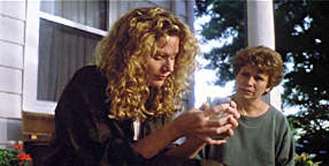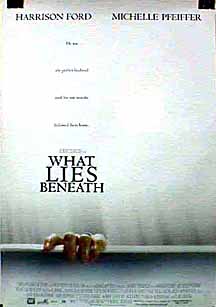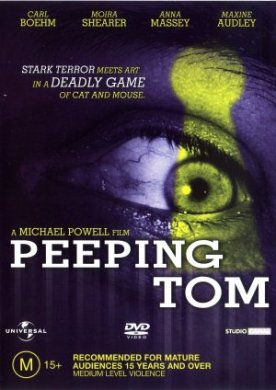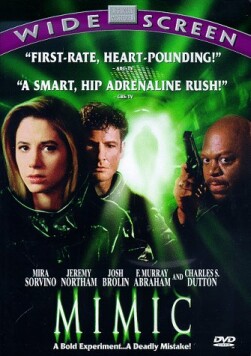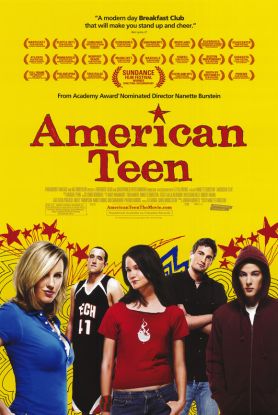Crossing Fields
Occasionally I go to see a film by a young independent director in the hopes of seeing some signs of life beyond the stuffed and mounted product of Hollywood—and hence in the hope of an escape from the moral smugness of the Hollywood ethos. But, judging by Crossing Fields, written and directed by a young filmmaker just out of NYU, James Rosenow, there is little for me to hope for. In fact, it is infinitely depressing that a young man like this who stands outside the mainstream should make so little use of his independence as to make a film which has nothing to say but what Hollywood has said a thousand times before, only without Hollywood’s subtlety and nuance.
The idea behind Crossing Fields is basically the same as the idea behind Pleasantville—namely the old 1970s dream that sexual liberation is wholly beneficent and brings with it all sorts of uncovenanted blessings, including artistic awareness and personal sensitivity and consideration and personal fulfilment, especially for women. It is all a lie, of course, but one that we have wanted to believe—especially Hollywood has wanted to believe it—for so long now that our mythmakers can’t stop setting up the same old bogeymen (religion, morality, conformity) in order that we may watch them being slain again and again by the forces of progress and free love.
The film, set in Ohio, begins with a church service involving public confessions. It tells the story of Jessica (Gwynyth Walsh) and her best friend Carol (Reedy Gibbs). Jessica introduces herself as “the town slut” and is taking revenge on her husband, Kevin, for a long-term infidelity with a neighbor by sleeping with half the men in town. Carol is shocked but also titillated by her friend’s behavior, and continually upbraids her for it while eagerly asking to hear more. “You don’t feel the least bit guilty about this, do you?” scolds Carol, half admiringly.
“If I were a man,” says the perkily feminist Jessica, “I would be a hero. . .nailing all these chicks.” Hm. Bet she never thought of it that way before.
Carol herself has a rock- solid marriage to Guy (J.K. Simmons) but a troublesome daughter called Denise (Meadow Sisto). Denise dresses provocatively, will not apply to colleges and sneaks out at night to sing with a rock band. There comes to live with them as a boarder James (William James Jones), a young black man who is trying to earn money for college. Carol begins to notice James’s manly form. Meanwhile, James is sleeping with her daughter and Jessica, both of whom insist it is no big deal, and being quite insistently unashamed of it. His example with respect both to sex and drugs finally makes its impression on the hitherto unimpeachably respectable Carol. Having said “With God, I don’t need drugs,” she is finally induced by James to smoke a joint. Suddenly she is relaxed and happy and laughing. She sees how talented her daughter is and comes home prepared to tolerate all the behavior she had formerly deplored.
Moreover, after one kiss with James, she takes his advice that sex while high is “incredible” and goes in to show lucky Guy a good time. Let’s see God do that for you! Meanwhile, Jessica is being persecuted by Kevin, who doesn’t want to give her a divorce and intervenes with the bank to cause her to be denied a mortgage loan on the farm, even though it has been in her family for three generations, because she will be a woman alone. She must therefore take Kevin back or lose the farm—in short, knuckle under to the sinister and oppressive powers of morality and respectability. She does so by coming forward to make her public confession in church, but not before making sure that she has something to confess—namely her seduction by James, which proceeds thus:
James tells Jessica he came to Ohio farm country to board and work because “I wanted to experience white people.”
Jessica tells James as she makes him a glass of lemonade: “Do you know how beautiful you are? Inside and out.”
There follows a sex scene between them which Carol, having already caught Denise and James in bed together, walks in on: “Does anybody have any morals anymore? I am so disappointed in both of you,” she says.
Such hilariously bad dialogue is the one thing that makes this radiantly awful film worth seeing if you haven’t got anything else to do. But it is a very small boon to be set against the boringly conventional moral sensibility behind it.
Discover more from James Bowman
Subscribe to get the latest posts to your email.

